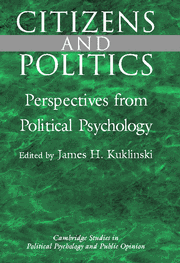Book contents
- Frontmatter
- Contents
- List of Contributors
- Prologue: Political Psychology and the Study of Citizens and Politics
- PART I AFFECT AND EMOTIONS
- Introduction
- 1 The Role of Affect in Symbolic Politics
- 2 Emotions and Politics: The Dynamic Functions of Emotionality
- 3 Cognitive Neuroscience, Emotion, and Leadership
- 4 Emotion as Virtue and Vice
- PART II POLITICAL COGNITION
- PART III POLITICAL ATTITUDES AND PERCEPTIONS
- PART IV POLITICAL VALUES
- Index
- Titles in the series
2 - Emotions and Politics: The Dynamic Functions of Emotionality
Published online by Cambridge University Press: 07 October 2011
- Frontmatter
- Contents
- List of Contributors
- Prologue: Political Psychology and the Study of Citizens and Politics
- PART I AFFECT AND EMOTIONS
- Introduction
- 1 The Role of Affect in Symbolic Politics
- 2 Emotions and Politics: The Dynamic Functions of Emotionality
- 3 Cognitive Neuroscience, Emotion, and Leadership
- 4 Emotion as Virtue and Vice
- PART II POLITICAL COGNITION
- PART III POLITICAL ATTITUDES AND PERCEPTIONS
- PART IV POLITICAL VALUES
- Index
- Titles in the series
Summary
It is usually more difficult to discover the right question than it is to find the answer. It is precisely at this point that the unexamined and unstated assumptions we make are most likely to defeat us, for the questions we ask grow out of the assumptions we make. … The assumptions we make tend to determine what we investigate, what kinds of techniques we use, and how we evaluate the evidence.
(Schattschneider, 1948, p. 21)Centuries ago, Western culture joined together two normative commitments, reason and democracy. While not everyone has shared those commitments, few would disagree with the claim that democracy's prospects are dependent on our capacity for reason, for leaders and followers alike. Together with those commitments, which we endorse, is a further presumption that passions undermine and degrade our reasoning capacity.
That presumption, that reason enables and passion disables, is largely to blame for the generally one-sided attention to the study of how humans reason. The dominant tradition in Western culture holds that it is through greater and better reliance on reason that humanity will progress to a better world. Through reason, humanity can remake itself and the world. Alas, if only humans were reasonable creatures!
Western culture, long ago, made a normative commitment to reason and held prospects for democracy to be dependent on fuller reliance on reason. Thus, reason and progress came to be joined in opposition to passion. We propose another solution.
- Type
- Chapter
- Information
- Citizens and PoliticsPerspectives from Political Psychology, pp. 41 - 67Publisher: Cambridge University PressPrint publication year: 2001
- 20
- Cited by



